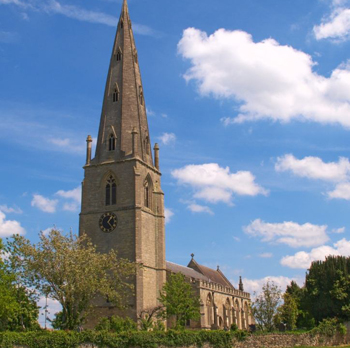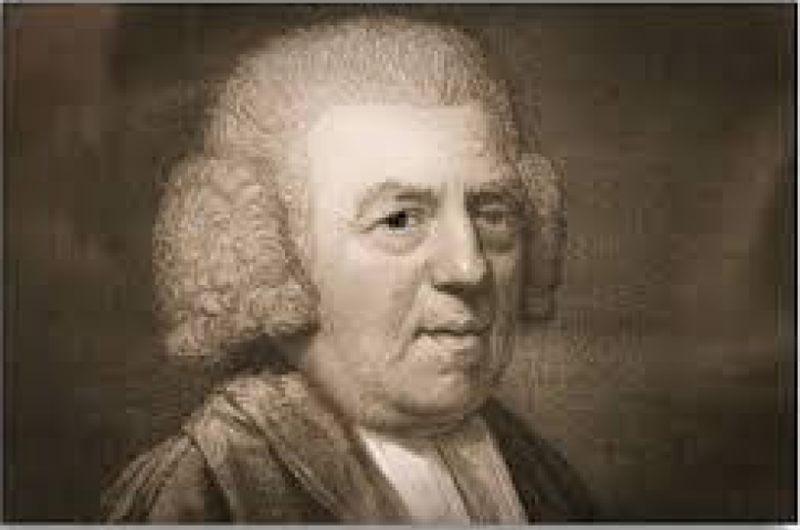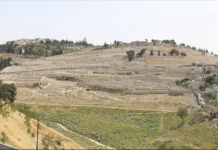By Charles Gardner —

It is my contention that wherever the gospel is faithfully preached and honored, support for Israel will never be far behind.
This was surely the case with respect to the globally-loved hymn, “Amazing Grace,” first sung in rural Buckinghamshire, England, 250 years ago to mark the new year of 1773.
It was written by former slave ship captain John Newton, curate (assistant priest) for the parish of Olney, as testimony to his own, undeserving, salvation in Christ, and begins:
Amazing Grace, how sweet the sound
That saved a wretch like me
I once was lost, but now am found
Was blind, but now I see
It has since been echoed throughout the world as the testimony of millions. But how is it connected with Israel?
Saved from shipwreck in a furious storm at sea after praying for mercy, Newton duly became a key witness in the long campaign for the abolition of slavery led by William Wilberforce.
Wilberforce also experienced a powerful conversion to Christ and was considering a pulpit ministry when Newton persuaded him to stay in politics where he was to become hugely influential in the major issues of the day – including the place of Israel in the world.
As it happens, it was shortly after the passing of the Abolition Bill, and Newton’s death, that Wilberforce became co-founder of the London Jews Society (later the Church Ministry among Jewish people) in 1809.

He thus helped to play his part, in a hugely significant way, in the restoration of the Jews, both physically to their ancient land and spiritually to recognition of their Messiah in Jesus.
As with other great evangelical Christians of the day – men like Charles Spurgeon, Charles Simeon and J C Ryle – he was persuaded of the significance of Old Testament end-time prophecies concerning the return of Jews to the Holy Land and their subsequent spiritual re-birth.
Being a leading MP, and friend of Prime Minister William Pitt, he was thus also able to influence other politicians of the timely opportunity given to Britain to help the Jewish people fulfill their destiny. This ultimately led to the Balfour Declaration of 1917 in which we promised to do all we could towards this end. The rest is history, as they say, and “Amazing Grace” had clearly played a key role in the end-time miracle of modern Israel.
The hymn was also featured – and indeed was the title – of the 2007 film on Wilberforce marking the bi-centenary of his successful campaign starring Ioan Gruffudd, with Benedict Cumberbatch as William Pitt and Albert Finney as John Newton.
During his 16 years at Olney (he was later rector of London’s St Mary Woolnoth), Newton and his friend and fellow poet William Cowper wrote a new hymn each week for the church prayer meeting.
Another popular Newton hymn – and my personal favorite – is “How Sweet the Name of Jesus Sounds.” The last two verses are especially apt for everyone who has known a complete transformation of the kind Newton experienced:
Weak is the effort of my heart
And cold my warmest thought
But when I see Thee as Thou art
I’ll praise Thee as I ought
Till then I would Thy love proclaim
With every fleeting breath
And may the music of Thy name
Refresh my soul in death.
Indeed, it was said that on his deathbed he uttered these immortal words: “I am a great sinner, but Christ is a great Savior.”
I too wanted to step up to the pulpit following my conversion 50 years ago. But God had other ideas, believing I could influence more people through my pen. And so I have the awesome privilege of sharing this amazing story with you. Praise the Lord, for he knows best!
Postscript dated 1/23/23
It turns out, according to my source Marylynn Rouse, of Kettering in Northamptonshire, that Newton had also expressed his love for Jews in a personal way.
In 1780, as recorded in a letter to his close friend, the poet and fellow hymn-writer William Cowper, he took his servant Phoebe to a London synagogue – presumably because she was Jewish – to her obvious great delight.
Later on, before the founding of CMJ and shortly before Newton himself died at the close of 1807 (after the passing of the Abolition Bill), he was mentioned as having attended a series of lectures for Jews at London’s Jewry Street Chapel.
Joseph Frey, a Messianic Jew who was to become the chief founder of CMJ, records: “Among the many ministers who attended was the late Rev John Newton, who was so affected that he wept like a child.”
In addition, Newton’s adopted niece Betsy Catlett, who lived with him from the age of five, left £50 (a significant sum in those days) in her will to CMJ, then known as the Society for Promoting Christianity among the Jews.
Christians around the world have been celebrating the 250th anniversary of Amazing Grace – even the BBC’s long-running Songs of Praise dedicated their weekly programme to the hymn.
During his 16 years as curate (assistant priest) at Olney, Buckinghamshire, Newton and Cowper between them wrote a new hymn each week for the church prayer meeting.
Amazing Grace was written to accompany Newton’s 1773 New Year’s Day sermon – an exposition and application of 1 Chronicles 17, specifically verses 16 and 17, expressing God’s graciousness in allowing King David (with all his faults) to rule forever – through his progeny – as ancestor of the Messiah.
It was in effect David’s own testimony of God’s Amazing Grace, as indeed the hymn told how the Lord had saved a ‘wretch’ like Newton – the former slave ship captain – to proclaim the mercy of the gospel to others. It has since also become the testimony of millions.
Here are a couple of examples of how the hymn connects with the Chronicles passage: verse 8, which reads “I (Yahweh) have been with you wherever you have gone and have cut off all your enemies from before you”, becomes “through many dangers, toils and snares, I have already come”.
And verse 26, “…you have promised this good thing to your servant”, becomes “the Lord has promised good to me”.
With grateful thanks to Marylynn. For more information, see her website on the John Newton Project – www.johnnewton.org



